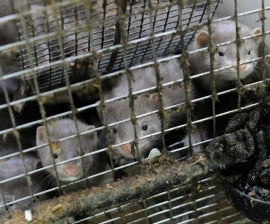-

It’s time to “call time” on cruel fur. Jo-Anne McArthur
LONDON—Fifty veterinary and animal behaviour experts have written to Environment Secretary Michael Gove to express their “concern at the severe animal welfare deficiencies inherent to the fur trade” ahead of Parliament debating a UK ban on fur imports next week.
The experts, including UN Ambassador of Peace and world renowned conservationist Dr Jane Goodall and wildlife expert Chris Packham, point to the “worrying, even distressing evidence of persistently poor welfare conditions” from multiple investigations at fur farms importing fur into the UK. The letter’s authors also say that the intensive way that wild species such as fox, raccoon dog and mink are kept in battery-cage farm systems “fail to satisfy some of their most basic needs, particularly their need to display normal behaviours essential for mental and physical well-being.”
Animal charity Humane Society International/UK, which leads the #FurFreeBritan campaign for a UK fur import ban, says the veterinarians’ letter serves to remind MPs to be beware of ‘welfare washing’ by the fur trade. At a recent fur inquiry evidence session, Mette Lykke Nielsen of Fur Europe told members of the Environment Food and Rural Affairs Committee that keeping foxes in small, wire cages for their entire life is natural and that such wild species are domesticated, astonishing assertions refuted as ‘inaccurate’ by the veterinary and animal behaviour experts.
Claire Bass from HSI/UK says: “It beggars belief that the fur trade would attempt to convince MPs that keeping a fox in a small wire cage for the whole of its life could ever be considered natural or acceptable. The life of an animal on a fur farm is one of monotonous deprivation, and it’s extremely common that the relentless boredom and lack of space triggers the repetitive pacing and spinning so indicative of mental disturbance. For the fur trade to shamelessly promote that miserable existence as ‘welfare friendly’ is surely taking their PR-spin to new levels of audacity. We hope that this letter from veterinary and animal welfare experts will remind MPs to beware of ‘welfare washing’ by the fur trade. It’s time to call time on cruel fur, it’s time for the UK to stop trading in this suffering.”
Signatories include Alick Simmons, former UK Deputy Chief Veterinary Officer; Professor Alastair MacMillan, former DEFRA veterinarian; Andrew Knight, Professor of Animal Welfare & Ethics at the University of Winchester, as well as TV vets and presenters Marc Abraham, Emma Milne, Scott Miller, James Greenwood, and Chris Packham. Read the full letter here.
Fur farming was banned in the UK in 2000, but since then Britain has imported animal fur worth more than £650 million from countries such as Italy, France, Poland, China and Russia where animals are typically bred in appalling conditions on fur farms. With around 135 million animals killed for their fur globally, HSI/UK estimates that some 2million animals a year could be suffering and dying for fur imported into the UK.
The experts’ letter reads: “Wild animals on fur farms live their lives in wire-floored cages thousands of times smaller than their natural territories. They are denied their biological inheritance to exhibit natural behaviours and stimulations such as hunting, digging and swimming. And they can be kept in what is for them unnatural social groups. For example naturally solitary mink are compelled to live in very close proximity to each other. These features of fur farms can inevitably lead to psychological stresses. Instances of stereotypical behaviour, a sign of compromised psychological well-being, have been well documented on fur farms, as has cannibalism, untreated wounds, foot deformities and eye infections.”
Support our efforts to protect animals from abuse.
The fur industry has funded various welfare certification schemes over the years in an attempt to welfare-wash fur, however such schemes rarely require more than the minimum legally required and lack sufficient standards and enrichments necessary for a wild animal to behave naturally in a cage.
The veterinary and animal behaviour experts agree, noting: “Almost 20 years ago, a Council of Europe Recommendation recognised the inherent welfare problems of battery cage fur farm systems, and urged that housing systems should be developed that allow animals to fulfil their biological needs, for example mink to access water for swimming, and foxes to be able to climb and dig as well as fulfil other ‘exploratory, territorial and social behaviour’. None of these natural behaviours are possible to any meaningful extent on typical fur farms, and such a barren and unnaturally limited environment can never be conducive to basic wellbeing. The presence of a single bone or section of plastic tube in an otherwise empty cage does not constitute sufficient or meaningful environmental enrichment.”
Most Brits support a UK fur ban. A YouGov opinion poll commissioned by HSI/UK shows that 69 per cent of the public are in favour of a UK fur ban, with only 8 per cent opposed. In March, campaigners submitted a petition with over 425,000 signatures to the Prime Minister, and the campaign is gaining traction in Westminster with a growing number of MPs of all political colours—including Conservatives Zac Goldsmith and Sir Roger Gale, Labour’s Kerry McCarthy and Daniel Zeichner, and Green Party co-leader Caroline Lucas—all declaring their support for a ban.
The Fur-Free Britain campaign is calling on the government to make the UK a fur-free zone by extending the current import ban on fur from cats, dogs and commercial seal hunts, to include all fur-bearing species including foxes, rabbits, mink, coyotes, raccoon dogs, and chinchillas. Take action to help.
ENDS
Media contact: HSI/UK: Wendy Higgins whiggins@hsi.org, (+44) 0 7989 972 423
